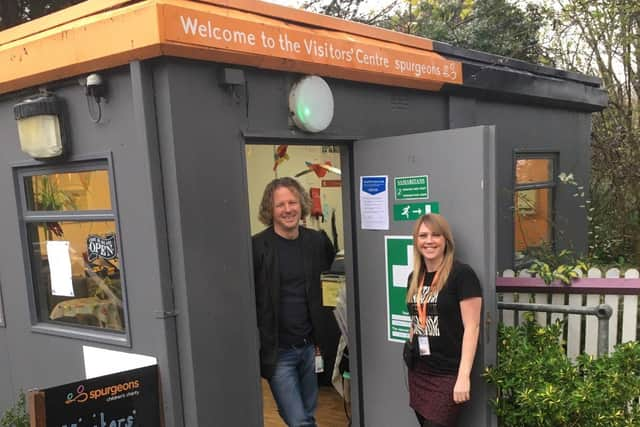High Sheriff of West Sussex, Dr Tim Fooks, meets Spurgeons’ prison-based family support team
and live on Freeview channel 276
The journey into a custodial prison sentence is often a complex one. Sadly, many have a history of re-offending, with Government records showing that 80 per cent of ex-inmates re-offend within nine years of release, and at least 40 per cent within the first 12months.
The reasons for such a significant re-offending rate are well-described. Accommodation and employment insecurity, financial difficulties and problems with drug and alcohol abuse are all known to lead back towards crime.
Advertisement
Hide AdAdvertisement
Hide AdBut, for many, their journey into significant criminality is closely linked to the adverse experiences they faced in childhood. The experience of any form of abuse, having a parent in prison, poor educational attainment and truancy may increase the risk of being imprisoned by a factor of 20.


With such a background, there is a real risk of an individual being trapped into a negative cycle of crime which, of itself, can impact their own families and children.
One of the most constructive elements of a prison sentence, therefore, can be the opportunity to address these family relationship issues and ensure that wherever possible, these negative cycles are broken and replaced with positive ones.
One of the key providers of this vital work at our Sussex prisons, HMP Ford and HMP Lewes, is the prison-based family support service run by Spurgeons Children’s Charity, and I was delighted to meet with the team on Zoom in the last week.
Advertisement
Hide AdAdvertisement
Hide AdSpurgeons works inside the prisons, supporting residents (prisoners) to maintain contact with their children and families. It offers activity packs for them to complete and send home, as well as advice on various topics, including tips on getting the most out of phone calls and the monthly video calls, which have replaced visits during the pandemic.
The charity also has staff and volunteers who provide support and information to those close to the prisoner, who are serving a ‘hidden sentence’ outside. These families may be struggling financially and their address may have been published in the press, resulting in unwanted attention.
Furthermore, the prisoner may have been a positive member of the family, a loving father, a supportive husband, the breadwinner and a carer, and, in these circumstances, Spurgeons can liaise with departments of the prison, signpost and refer to other agencies as well as provide emotional support.
In some cases, a prison sentence will result in the prisoner’s children needing to be adopted and Spurgeons can help to arrange for a father to have a final visit with their children to say goodbye and to contribute to the child’s memory box with letters and photos.
Advertisement
Hide AdAdvertisement
Hide AdChildren need their parents. No matter how they may let them down, children will always want to connect with their birth mother and father in some way and it is the charity’s mission to support the men to be the fathers they believe their children deserve.
In this effort, Spurgeons provides self-study courses in parenting and relationships. The Covid restrictions have required prison residents to be locked in their cells for all but 30 minutes a day. However, through using the course, the charity’s team is able to correspond with the fathers, as well as have telephone conversations and work with them individually.
Building on the success of their current workbooks, they are now being developed to encourage an increasing awareness of the resident’s own childhood experiences and how these inform their adult life choices.
Purpose and belonging are the two main pillars of rehabilitation and the charity is hopeful that the new course will add to the factors that protect these men from re-offending and further damaging their own and their family’s lives.
Advertisement
Hide AdAdvertisement
Hide AdIf you would like to support Spurgeons’ family services with this important work, please use the following link: spurgeons.org/ford-and-lewes-appeal
For more general information, please contact: [email protected]